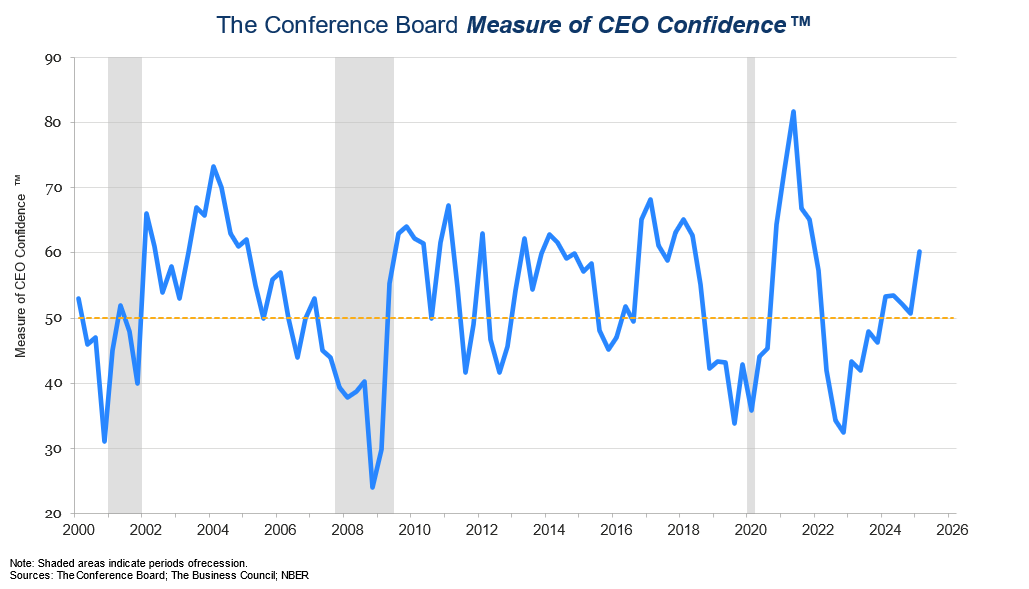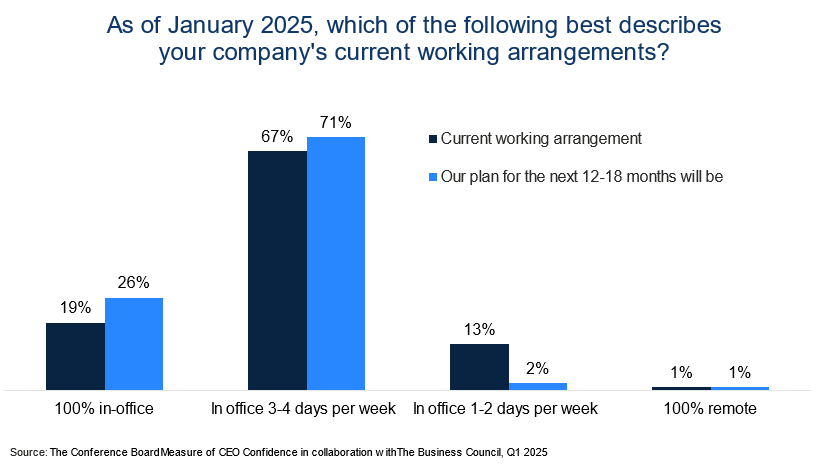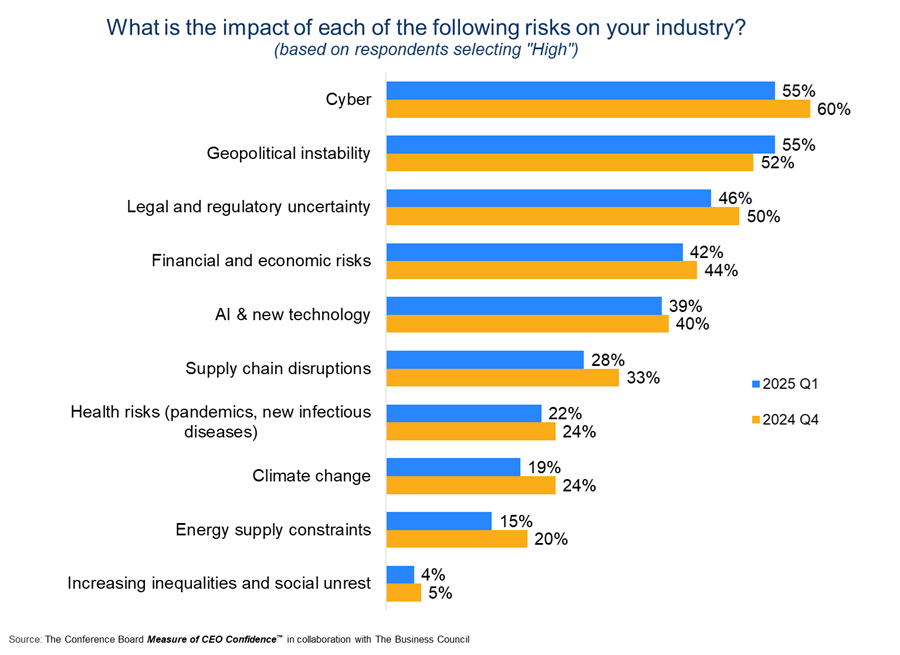The Conference Board Measure of CEO Confidence™ is a barometer of the health of the US economy from the perspective of US chief executives. The measure of CEO confidence is based on CEOs' perceptions of current and expected business and industry conditions. The survey also gauges CEOs' expectations about future actions their companies plan on taking in four key areas: capital spending, employment, recruiting, and wages.
CEO Confidence Increased Sharply in Q1 2025
Latest Press Release
Updated: Thursday, February 20, 2025
From cautious optimism to confident optimism
The Conference Board Measure of CEO Confidence™ in collaboration with The Business Council increased by 9 points in the first quarter of 2025 to 60, the highest level in three years. For the first time since early 2022, the Measure was well above 50 in Q1 2025, indicating that CEOs have shifted from the cautious optimism that prevailed in 2024 to a more confident optimism. (A reading above 50 reflects more positive than negative responses.) A total of 134 CEOs participated in the Q1 survey, which was fielded from January 27 to February 10.
“The improvement in CEO Confidence in the first quarter of 2025 was significant and broad-based,” said Stephanie Guichard, Senior Economist, Global Indicators, The Conference Board. “All components of the Measure improved, as CEOs were substantially more optimistic about current economic conditions as well as about future economic conditions—both overall and in their own industries. CEOs’ assessments of current conditions in their own industries also improved. (This measure is not included in calculating the topline Confidence measure). Consistent with an improved expected outlook, there was a notable increase in the share of CEOs expecting to increase investment plans and a decline in the share expecting to downsize investment plans. Still, a majority of CEOs indicated no revisions to their capital spending plans over the next 12 months.”
“Accompanying Q1’s surge in confidence, CEOs also reported an easing of concerns regarding a range of business risks,” said Roger W. Ferguson, Jr., Vice Chairman of The Business Council and Chair Emeritus of The Conference Board. “Compared to Q4 2024, fewer CEOs ranked cyber threats, regulatory uncertainty, financial and economic risks, and supply chain disruptions as high-impact risks. The one exception was geopolitical instability, which 55% of CEOs in Q1 saw as a high-impact risk to their industry—up from 52% last quarter.”

Overall, 73% of CEOs planned to grow or maintain the size of their workforce over the next 12 months, virtually unchanged from last quarter. However, the share expecting to expand their workforce fell to 32%—down from 40% in Q4—while the share planning no change in employment rose to 41%, up from 34%. Notably, the share planning to reduce their workforce ticked up again, rising 1 ppt to 27%. Fewer CEOs reported difficulty finding qualified workers in Q1.
The share of CEOs planning to raise wages by 3% or more over the year climbed to 71%, up from 63% in Q4. A majority of CEOs—60%—plan wage increases in the 3.0–3.9% range, up from 48%. Regarding work arrangements, a schedule with 3-4 days a week in the office remained the most popular option. However, the share of CEOs planning to shift away from remote work—toward 3-4 days or 100% in-office—over the next 12-18 months continued to climb.
Current Conditions
CEOs’ assessment of general economic conditions became positive in Q1 2025:
- 44% of CEOs said economic conditions were better than six months ago, up from just 20% last quarter.
- 11% said economic conditions were worse, down significantly from 30% in Q4 2024.
CEOs’ assessments of conditions in their own industries also flipped to positive in Q1:
- 37% said conditions in their own industries were better than six months ago, up from 21% in Q4.
- 22% of CEOs said conditions in their industries were worse, down from 34%.
Future Conditions
CEOs’ expectations about the short-term economic outlook surged in Q1 2025:
- 56% of CEOs expected economic conditions to improve over the next six months, up from 33% in Q4.
- 15% expected conditions to worsen, down from 23%.
CEOs’ expectations for short-term prospects in their own industries also became far more optimistic:
- 52% of CEOs expected conditions in their own industry to improve over the next six months, up from 31% in Q4.
- 14% expected conditions to worsen, down from 22.
Employment, Recruiting, Wages, and Capital Spending
- Employment: 41% of CEOs planned to maintain their workforce. The share of CEOs expecting to increase their workforce declined from 40% to 32%, and there was a slight increase in the percentage expecting a net reduction.
- Hiring Qualified People: Labor shortages continued to ease, with more CEOs reporting no or little problems hiring.
- Wages: A majority of CEOs (60%) planned to increase salaries by 3.0–3.9% over the next 12 months.
- Capital Spending: 54% of CEOs signaled no desire to change their capital spending plans in the next 12 months. There was an uptick in the share revising up spending plans—to 33% in Q1 from 25% in Q4 2024.
Work Arrangements and Return to Office:
Most companies have a hybrid work arrangement, but more CEOs plan on shifting toward a 100% in-office workforce:

Industry Risks:
Compared to last quarter, the impact and intensity of most risks have declined among CEOs:

About The Conference Board
The Conference Board is the member-driven think tank that delivers Trusted Insights for What’s Ahead®. Founded in 1916, we are a non-partisan, not-for-profit entity holding 501 (c) (3) tax-exempt status in the United States. ConferenceBoard.org
About The Business Council
The Business Council is a forum for the CEOs of the world’s largest multinational corporations across all industry sectors. Members gather several times each year to share best practices, network and engage in intellectually provocative, enlightening discussions with peers and thought-leaders in business, government, academia, science, technology and other disciplines. Through the medium of discussion, the Council seeks to foster greater understanding of the major opportunities and challenges facing business, and to create consensus for solutions. The Business Council is a non-partisan, not-for-profit entity holding 501 (c) (6) tax-exempt status. The Business Council does not lobby. Visit The Business Council’s website at www.thebusinesscouncil.org
For further information contact:
Joseph Diblasi
1 781 308 7935
Joseph.DiBlasi@conference-board.org











